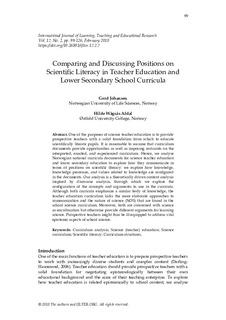| dc.contributor.author | Johansen, Gerd | |
| dc.contributor.author | Afdal, Hilde Wågsås | |
| dc.date.accessioned | 2019-03-08T16:03:26Z | |
| dc.date.available | 2019-03-08T16:03:26Z | |
| dc.date.created | 2018-02-28T09:48:39Z | |
| dc.date.issued | 2018 | |
| dc.identifier.citation | International Journal of Learning, Teaching and Educational Research. 2018, 17 (2), 99-126. | nb_NO |
| dc.identifier.issn | 1694-2116 | |
| dc.identifier.uri | http://hdl.handle.net/11250/2589455 | |
| dc.description.abstract | One of the purposes of science teacher education is to provide prospective teachers with a solid foundation from which to educate scientifically literate pupils. It is reasonable to assume that curriculum documents provide opportunities as well as imposing restraints on the interpreted, enacted, and experienced curriculum. Hence, we analyse Norwegian national curricula documents for science teacher education and lower secondary education to explore how they communicate in terms of positions on scientific literacy: we explore how knowledge, knowledge processes, and values related to knowledge are configured in the documents. Our analysis is a theoretically driven content analysis inspired by discourse analysis, through which we explore the configuration of the concepts and arguments in use in the curricula. Although both curricula emphasize a similar body of knowledge, the teacher education curriculum lacks the more elaborate approaches to communication and the nature of science (NOS) that are found in the school science curriculum. Moreover, both are concerned with science as enculturation but otherwise provide different arguments for learning science. Prospective teachers might thus be ill-equipped to address vital epistemic aspects of school science. | nb_NO |
| dc.language.iso | eng | nb_NO |
| dc.publisher | Society for Research and Knowledge Management, Mauritius | nb_NO |
| dc.subject | Curriculum analysis | nb_NO |
| dc.subject | Science (teacher) education | nb_NO |
| dc.subject | Science curriculum | nb_NO |
| dc.subject | Scientific literacy | nb_NO |
| dc.subject | Curriculum structures | nb_NO |
| dc.title | Comparing and discussing positions on scientific literacy in teacher education and lower secondary school curricula | nb_NO |
| dc.type | Journal article | nb_NO |
| dc.type | Peer reviewed | nb_NO |
| dc.description.version | publishedVersion | nb_NO |
| dc.subject.nsi | VDP::Samfunnsvitenskap: 200::Pedagogiske fag: 280 | nb_NO |
| dc.source.pagenumber | 99-126 | nb_NO |
| dc.source.volume | 17 | nb_NO |
| dc.source.journal | International Journal of Learning, Teaching and Educational Research | nb_NO |
| dc.source.issue | 2 | nb_NO |
| dc.identifier.doi | 10.26803/ijlter.17.2.7 | |
| dc.identifier.cristin | 1569326 | |
| cristin.unitcode | 224,30,0,0 | |
| cristin.unitname | Avdeling for lærerutdanning | |
| cristin.ispublished | true | |
| cristin.fulltext | original | |
| cristin.qualitycode | 1 | |
